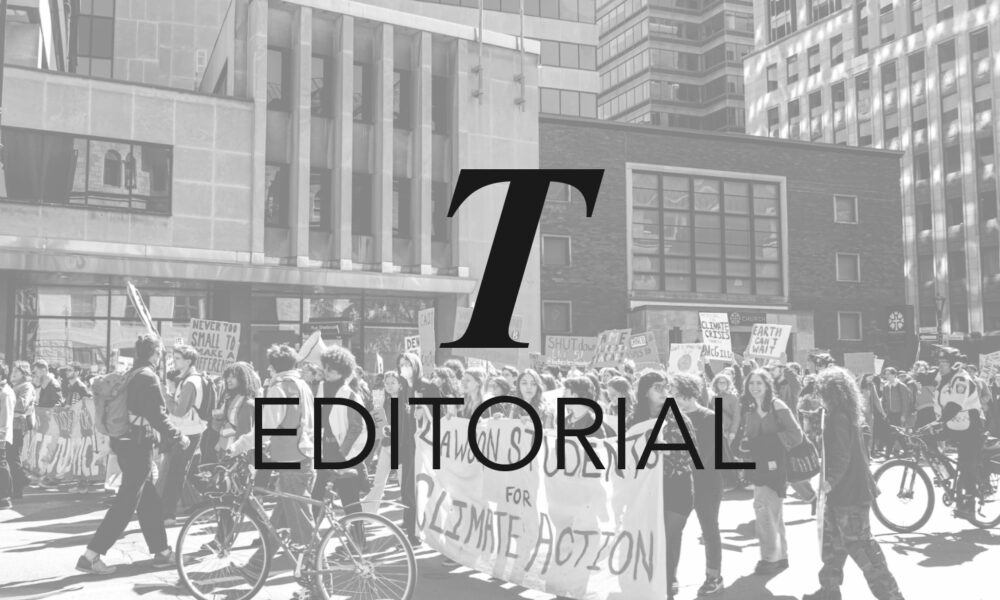The past week has been marked by a heatwave sweeping across the country, with temperatures rising approximately ten degrees higher than the September average in Montreal. As McGill students walked to classes through the humid air, one thing was made clear: Even the most privileged are no longer spared from the effects of climate change.
The recent heatwave is only the latest example of climate change’s devastating effects. As of now, the wildfires raging across Canada this summer have destroyed 165,000 square kilometres of land, making it impossible to ignore the life-threatening reality of the climate crisis. Even within the comfort of the McGill bubble, smoke filled the lungs of anyone outdoors in the weeks of late June when Canadian cities experienced the worst air quality in the world.
In cities where the search for affordable housing is already a heavy weight on the shoulders of young adults, the climate crisis only serves to exacerbate this issue. In California, where subsidized housing is being built in wildfire-prone areas, insurance companies are gradually starting to pull out, leaving residents unsafe and uninsured. In Canada, Desjardins is threatening to increase insurance premiums in response to Quebec’s wildfires. While the government has failed to control the current housing crisis, it has surveilled, policed, and underserved unhoused populations in Montreal who need care, shelter, and social services. Moreover, the lack of compassion toward wildfire victims does not address the struggles displaced populations face in acquiring permanent, safe housing.
Despite climate change’s universal consequences, Indigenous peoples in Canada are still disproportionately affected by the climate crisis. When land turns into property, when respect for the land turns into greed, climate change becomes the ultimate effect of settler colonialism. We must listen to Indigenous voices and seek solutions from those who know and care for the land and its many relations best. Indigenous peoples, who make up just five percent of the world’s population, protect 80 per cent of our global biodiversity. Embracing a comparative approach to climate justice will allow governments to understand what land means to others to better protect it. The loss of land for Indigenous peoples in rural and urban spaces goes beyond economic interests or environmental violence as the loss of a core, grounded, and personal connection, built from a young age.
Still, the Canadian government will not say or practice Land Back. Indeed, when it comes to Canada’s attitude toward the climate crisis, the Greenbelt controversy represents its failures. Ontario’s Greenbelt––a protected area of two million acres of farmland, forests, and rivers––prevents urban sprawl and ensures Ontarians’ access to local food, clean water, and nature. Last year, however, Ontario’s Progressive Conservative government announced the construction of 50,000 homes in these protected areas, thus removing 7,400 acres of land from the Greenbelt and using the housing crisis as an excuse to please donors. The housing crisis is not a reason to dismiss environmental protections and vital legislation that safeguards the little protected land Canada has left.
Yet, both the government and institutions such as McGill engage in the individualistic rhetoric of climate change, displacing the blame on everyday people to protect themselves. With every summer getting hotter and every fire burning more fiercely than the last, throwing your bottle in the right bin on campus will never be enough. What we need is collective action on the ground and legislative action from above.
McGill needs to put an end to its greenwashing campaign and take action. As a university that takes pride in its brilliant researchers, McGill must listen to the voices of environment experts around the world. Fossil fuels are by far the biggest contributors to global climate change, accounting for nearly 90 per cent of all carbon dioxide emissions. McGill, which is investing tens of millions of dollars in the fossil fuel industry—$11,982,749 in Royal Bank of Canada and $2,610,419 in TC Energy as of Dec. 31, 2022—is not only complicit in global warming, it is complicit in the forests that are burning and in all the disasters to come. McGill needed to take climate action 20 years ago and now, more than ever, it needs to divest once and for all.








